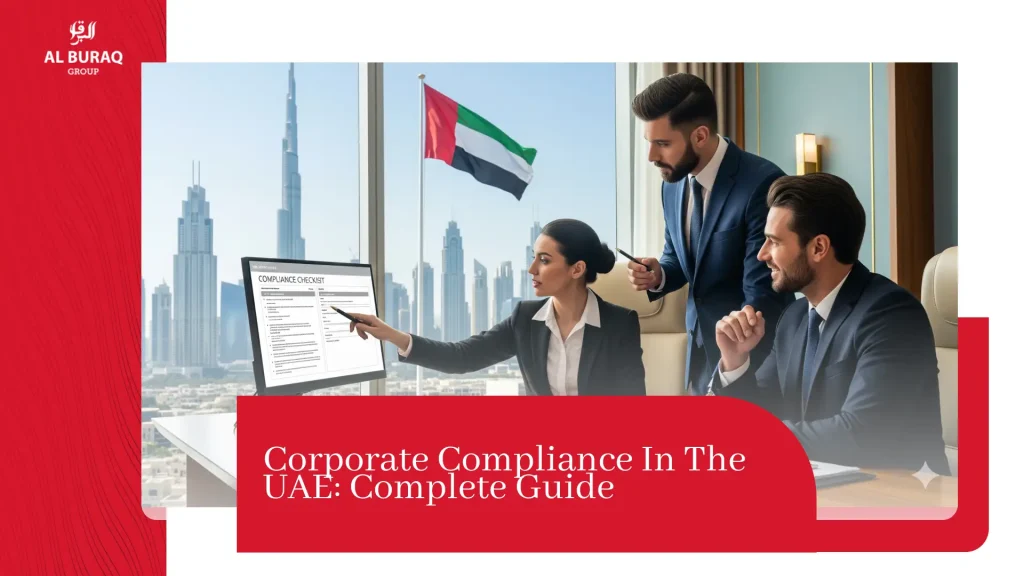Imagine operating your business in the UAE with confidence. Like no unexpected fines, no paperwork pile-ups, just smooth operations. That’s the magic of strong corporate compliance.
The UAE’s rules have evolved in the year 2025. From transparent ownership to tax reforms, Emiratisation mandates, and anti-money laundering safeguards. Staying compliant means staying strong if you either run a startup in Ras Al Khaimah or head a multinational in Dubai.
The blog post unpacks the essentials. Explore what compliance looks like and the recent 2025 changes you can’t overlook. We’ll also deep dive into the practical tips to keep your business on the right side of the law.
Why Corporate Compliance Matters in the UAE
The UAE climbs higher on global markets as officials raise the bar. Corporate compliance drives trust with regulators. This enables smoother audits and avoids penalties that can hurt operations. Further, growing areas like DIFC and ADGM now demand even stricter governance. Operating cleanly today unlocks growth. Therefore, sticking your head in the sand risks costly disruptions tomorrow.
Now, we are walking through the key areas you need to track.
2025 Updates You Can’t Ignore
We have gathered important updates that you must look into to keep yourself fully aware as a business owner in the UAE:
1. Corporate Tax & Global Minimum Tax
Starting January 2025, the UAE applies a 15% minimum top-up tax on large multinationals with global revenue over €750M. At the same time, continuing support for startups is visible. Under the Small Business Relief program, businesses earning below AED 375,000 still enjoy 0% tax. Companies with revenues over AED 50M now file quarterly corporate tax reports. Meanwhile, expanded transfer pricing rules tighten scrutiny.
2. Beneficial Ownership Transparency
If someone owns 25% or more of your company, their details must be on record. In 2025, enforcement got stronger. Missing or inaccurate UBO data can cost up to AED 100,000. Authorities even tie UBO data into AML risk profiles, increasing compliance pressure.
3. Anti-Money Laundering & Financial Controls
In 2025, the UAE levied AED 339 million in fines alone for money laundering breaches. Authorities now demand tighter due diligence. Especially for transactions over AED 100,000. Even speeding suspicious activity reporting to 24 hours.
4. Corporate Governance & Gender Balance
Boards are becoming more representative. As of 2025, all private joint-stock companies must appoint at least one woman director. At the same time, updated policies require holistic disclosures. This covers ESG, internal controls, and risk practices.
5. Internal Controls & Risk Management for Listed Firms
UAE-listed companies must now undergo Internal Control Over Financial Reporting audits and risk frameworks. Now, regulatory oversight expects transparency in operations, cybersecurity, and fraud safeguards.
6. Emiratisation Benchmarks
Private companies with 20–49 employees must now hire at least two Emiratis; larger firms must raise Emirati representation in skilled roles by 2% annually. Miss the mark, and fines climb sharply. The businesses will face AED 96,000 in 2025 to AED 108,000 in 2026.
7. Economic Substance Regulations (ESR) & UBO
Companies in banking, IP, holding, and other categories must report adequate “economic presence,” such as local staff, spending, and management. ESR filings must be submitted by June each year.
8. VAT, Audits & Data Protection
Businesses with a turnover above AED 375,000 must register for VAT. Maintaining five years of audited records is mandatory. Even for Free Zone firms under new audit regimes. UAE’s federal data protection law (PDPL) also now mirrors GDPR-level standards.
9. Merger Control & Anti-Competition Rules
Since 2023, mergers with combined UAE sales over AED 300M or over 40% market share need Economy Ministry approval or face big fines. Also, cartel behaviors like price-fixing or bid-rigging now face legal prohibition.
10. Cybersecurity Oversight
The DFSA reports 75% of firms now mandate reviews of third-party providers before granting access. Cyber risk governance is a high priority. Expect a surge in enforcement post-2025.
Practical Payoffs of Staying Compliant
Thinking about what you’ll get against being compliant? The following are some of the examples. We have gathered the real perks in the form of a table for your better understanding.
| Area | Real-World Benefit |
| Tax & UBO | Avoid surprise fines; win bank trust |
| AML | Reduced financial risk; better investor confidence |
| Governance | Enhance board credibility, support ESG |
| Emiratisation | Meet local hiring goals, unlock incentives |
| ESR | Qualify for free zone perks and tax breaks |
| VAT & Audits | Clean books, smoother audit cycles |
| Cybersecurity | Protect operations and reputation |
In short, compliance isn’t a cost, but it’s a chance to safeguard and scale.
How to Build Smarter Compliance
No need to worry about following corporate compliance. It will become easier for you and your business to comply fully. All you need to follow the techniques shared below.
-
Appoint a Compliance Lead
Make someone the go-to person for everything from UBO updates to Emiratisation records.
-
Automate Where You Can
Use accounting tools that pull UBO, VAT, and audit data automatically. This reduces human error.
-
Run Regular Internal Audits
Spot gaps early, especially around AML, risk frameworks, and internal controls.
-
Train the Team
From finance to HR, ensure every employee understands new thresholds and reporting rules.
-
Review Quarterly
Check tax filings, Emiratisation progress, audit prep, and board composition every three months.
-
Work with Trusted Advisers
Local lawyers and auditors help keep you compliant. Especially as frameworks evolve fast.
Final Thoughts
2025 has raised the bar for corporate tax compliance in the UAE, yet that’s good news. With clear frameworks around taxes, ownership, governance, diversity, and ESG, the UAE signals it’s serious about global business standards. Compliance builds trust and opens doors.
Ready to get ahead? If you want help aligning your business with new rules, contact Al-Buraq today! Find expert legal support, chat with us.
Let us know if you’d like a breakdown by sector. The top sectors like fintech, retail, or manufacturing, we cover all sectors. So you can deep dive into your compliance needs.
The article is written to provide you with detailed, latest updates on UAE corporate compliance as of August 2025. At Al Buraq, we tried our best to make your businesses fully compliant and adhere to UAE laws.



